Hurricane Katrina

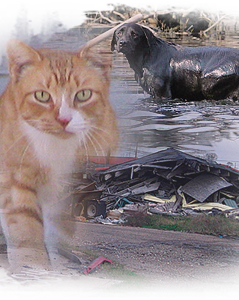
Jun 10 2007
Alone, After Katrina
- Shannon Moore, 7/22/69 - 5/30/06
- Voucher Program To End
- Urge St. John To Rebuild Shelter
- Katrina Homeless Pet Crisis
- Katrina Lifeline Transport
- Dogs Shot In Lincoln Parish
- Barn Homes For Katrina Survivors
- Food/Water Still Needed?
- NOLA Sweeties Need Homes
- Adopt From Plaquemines
- Lakeview Cats Roaming
- Woman Behind Spay/Neuter Bill
- Lemonade Stand To Aid Dogs
- Adopters Return Katrina Dogs
Rebuild Animal Shelter
5/24/07 Humane Society Of Louisiana, Jeff Dorson ~ Seems most St. John Parish council members have little interest in rebuilding the decaying St. John Parish Animal Shelter in LaPlace, LA. Even though the parish population continues to expand with post-Katrina demographics, parish council refuses to vote to on the local animal shelter. A rebuild vote has languished on the council agenda for 18 months, but action is always deferred. The overcrowded shelter lacks proper ventilation, heat, and protection from the elements. The original structure was built in the 1970s to store equipment.Ask Parish Council Members to vote now to build a new shelter. Humane animal services are vital to any community.
Cheryl Millet, #7 • Ronnie Smith, #6
Sean Roussel, #5 • Jaclyn Hotard, #4
Richard Wolfe, #3 • Lester Rainey, #1
Steve Lee, At Large • Cleveland Farlough
Allen St. Pierre: 504-559-0293
Shannon Hartwick Moore
July 22, 1969 ~ May 30, 2006
6/1/07, LeAnn G ~ Yesterday marked one year since the animal rescue world lost one of its most dedicated and hard-working volunteers. Rest in Peace, Angel. You are dearly missed.
~ Memorial Guest Book
~ Shannon, I Forgot To Tell You
~ Memories Of Shannon Blog
~ Photos Of Shannon
~ Photos: People & Pets Rally
6/8/07, Spaymart ~ As of August or early September, the present voucher program will terminate, leaving feral cat caregivers and others unable to secure low-cost spay/neuter. The city is overrun with homeless, free-roaming cats and dogs whose only hope of sterilization is extension of the voucher system. Please write to ASPCA, stating in your own words why the present program must continue. Otherwise, all of us will have to pay the going rate (normally $50 to $75 at low cost facilities), or even worse, abandon the issue altogether at the expense of animals. Questions? Email mary@la-spca.org or lynnchiche@cox.net
Send Comments To:
Aimee St. Arnaud, ASPCA: aimees@aspca.org
P.O. Box 820 / Perryburg, OH 43552
July 22, 1969 ~ May 30, 2006
6/1/07, LeAnn G ~ Yesterday marked one year since the animal rescue world lost one of its most dedicated and hard-working volunteers. Rest in Peace, Angel. You are dearly missed.
~ Memorial Guest Book
~ Shannon, I Forgot To Tell You
~ Memories Of Shannon Blog
~ Photos Of Shannon
~ Photos: People & Pets Rally
Voucher Program To End?
Speak Out If You Want Nola Vouchers To Stay6/8/07, Spaymart ~ As of August or early September, the present voucher program will terminate, leaving feral cat caregivers and others unable to secure low-cost spay/neuter. The city is overrun with homeless, free-roaming cats and dogs whose only hope of sterilization is extension of the voucher system. Please write to ASPCA, stating in your own words why the present program must continue. Otherwise, all of us will have to pay the going rate (normally $50 to $75 at low cost facilities), or even worse, abandon the issue altogether at the expense of animals. Questions? Email mary@la-spca.org or lynnchiche@cox.net
Send Comments To:
Aimee St. Arnaud, ASPCA: aimees@aspca.org
P.O. Box 820 / Perryburg, OH 43552

Barb Dunsmore sets food/water for left behind animals roaming Upper 9th Ward West, as part of a Kinship Circle aid team. Photos (c) Kinship Circle, NOLA
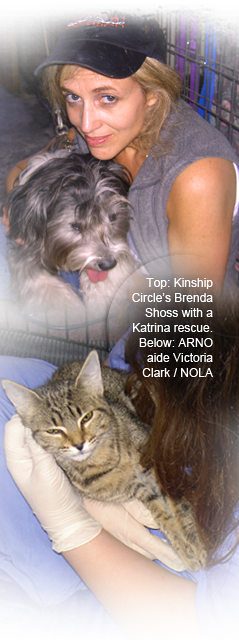

Katrina Homeless Pet Crisis
Left Photo Above: Laura Horrigan, an ARNO volunteer, visits Hank, whose family gave him up 10 months after Katrina. (Lori Waselchuk/The Times). Right: Grady Ballard walks Hank at ARNO as part of Kinship Circle's NOLA aid team. (Kinship Circle).5/29/07 Los Angeles Times ~ Hank, a strapping purebred golden retriever, is typical of second-wave pet problems in the 21 months since Hurricane Katrina hit. The first crisis was those lost, abandoned or killed in the storm and its immediate aftermath. Now there are pets like Hank, who stayed with his New Orleans East guardians for 10 months after Katrina, which submerged their home in 7 feet of water.
After moving several times and struggling to rebuild their lives, Hank's guardians realized they could no longer cope with a dog. So they surrendered Hank to Animal Rescue New Orleans, a group that cares for animals left behind or separated from guardians.
Hank bounded with joy as ARNO shelter manager Robin Beaulieu entered his pen one afternoon. He flipped onto his back for a tummy rub. "He loves to be petted and groomed," Beaulieu said. The dog has lived at ARNO for 8 months as he awaits a new home.
Animal advocates say many animal caregivers, living in trailers and tight on cash while they rebuild, give up animals because they don't have space or funds to keep them. "So many need help with their pets," said Charlotte Bass Lilly, ARNO's executive director. Beaulieu estimated the number of families that surrender pets had risen from 45# to 60# since Katrina. ARNO was founded shortly after the storm.
Laura K. Maloney, executive director of Louisiana Society for the Prevention of Cruelty to Animals, said that although some animals could be the offspring of animals separated from their families since the storm, most put up for adoption by the agency are pets relinquished by caregivers.
According to LA-SPCA statistics:
- About 259,400 families lived with pets in Orleans Parish before the storm.
- As many as 104,000 were left behind after Katrina.
- About 15,000 were officially rescued.
- An estimated 3,000 have been reunited with families.
- At least 88,700 pets remain unaccounted for. Thousands of pets are believed dead.
ARNO and other animal advocacy groups believe many street strays are "Katrina pets" and their 4th or 5th-generation offspring. Most are not spayed or neutered. Bass Lilly said that unscientific counts by ARNO volunteers who manage 3,000 feeding stations across Orleans, Plaquemines and St. Bernard parishes indicate some 40,000 cats and 5,000 dogs on the streets. "There are still dogs out there with collars." Bass Lilly added that though abandoned animals were not unique to New Orleans, "the difference is that these animals are without food, water or even garbage to forage."
University of Pennsylvania researchers surveyed six areas of Orleans and St. Bernard parishes on behalf of LA-SPCA six months after the storm and found that "relatively few" homeless animals remained.
Maloney said feeding stations were not "in the best interest" of stray animals and made it more challenging to capture them. "We are taking animals left there and sustaining them," she added. "That doesn't solve our problem. We are creating more homeless kittens and puppies, and we need to stop."
ARNO food sites cover a 685-sq-mile radius, Beaulieu said. Volunteers try to capture animals for sterilization. Feral cats are trapped, neutered and released. Bass Lilly said that in the last nine months, ARNO had found new homes for an average 200 animals monthly. Since Katrina, volunteers had reunited 50 to 70 pets.
Reunifications are still crucial almost two years after the storm, animal advocates contend. "Every day, animals show up," said Laura Bergerol, a volunteer with a grassroots online group called Katrina Animal Reunion Team. The animals are featured in newspaper ads, on sites advertising missing pets, and even on Craig's List, said Bergerol, who is based in Palo Alto.
About 200 animals live at ARNO's shelter, a warehouse in Jefferson Parish. Bass Lilly said the group has a no-kill policy. ARNO survives on donations from private sources and other nonprofit groups.
One day, a cacophony of barks blended with the occasional purr as Beaulieu showed volunteer Ray Forrester how to trap kittens in his Kenner neighborhood. "You line the cage with newspaper and put food on it," Beaulieu said. "Sardines are best. Popeyes fried chicken works wonders." Cats are typically trapped in cages, dogs with a noose. It can take several months to win an animal's confidence.
With the population of New Orleans down half its size, and thousands in Louisiana living in cramped trailers, there are less local takers for Katrina pets. So ARNO works with partners nationwide to find homes for animals. "Katrina animal celebrity is a way people feel they can directly help with Katrina," Beaulieu said.
Katrina Lifeline
Reply To: Katrina LifelineGaro Alexanian, 718-544-7387
Companion Animal Network
P.O. Box 750214
Forest Hills, NY 11375
All 35 pups from a 4/2 transport were adopted at North Shore Animal League. Six LA animal control agencies, rescues, vets, and independent rescuers contributed to this success. Congrats to agencies of Terrebonne, St. Bernard, St. Johns, and Jefferson Davis, plus Animal Rescue Foundation and vet practices.
We invite all southern Louisiana animal control agencies (except Lafayette Parish animal control), rescue groups, and independent rescuers to participate. Transport costs are pre-paid by Katrina Lifeline's rescue partner, North Shore Animal League America. Required: Rabies shot for puppies with two or more adult teeth (approx. 12 weeks) and a state health certificate. Puppies up to 15 weeks are sought.
Litters cannot not be intermingled, to prevent parvo, distemper or upper respiratory outbreak. We need photos and basic info on puppies. That's it, to get southern pups a new life in and around the Big Apple!
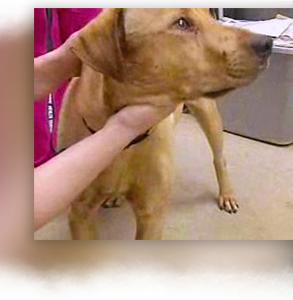
Dogs Shot In Lincoln Parish Cruelty Case
Reply To: Humane Society Of Louisiana Lincoln Chapter, Rebecca Kaase
Ruston, TV-8 News ~ Lincoln Parish animal control has arrested a man for animal cruelty. His case is one of two dog shootings in the parish.
A stray dog is recovering from facial buckshot wounds at a Lincoln Parish animal hospital. Hospital staff call him Old Yeller. Lincoln Parish Humane Society President Rebecca Kaase wants you to know that if you harm an animal, you will be prosecuted under the law and face a $1000 fine plus possible six months in jail for animal cruelty." They do not know who shot Old Yeller.
Old Yeller marks the second recent attack on a Lincoln Parish dog. John Lee, 83, of Choudrant was arrested for shooting another dog. Lee said the animal was dangerous and aggressive. The dog survived.
Kaase says penalty should serve as a deterrent to animal cruelty. "It is illegal to treat animals this way. If you have a problem with your neighbor's pet, talk to them. If you need a mediator call the sheriff's office or somebody. But do not shoot or kill any animal because you feel that animal is a nuisance." As Old Yeller heals, he needs a place to call home.
Barns For Hurricane Survivors
5/30/07 ~ The Cat Help Desk has several urgent requests to relocate cat colonies. We are racing against the clock to spare the little hurricane survivors from a death sentence at Animal Control. We can only save them if we find a barn or other suitable location with someone willing to feed them. If you have any leads on places in Louisiana and surrounding areas, please forward to: Leigh Schmitt or info@cathelpdesk.orgIs Food/Water Program Still Needed In New Orleans?
From Food/Water Assignments Director For Original Arno, Brenda Shoss ~ Since original ARNO initiated its food/water program to cover 650 sq. miles in Orleans, St. Bernard and Plaquemines Parishes, controversy has surrounded the notion of sustaining stranded animals in sparsely repopulated areas. When Kinship Circle's 5-person team recently fed in Upper 9th Ward East/West and Plaquemines, we received a negative letter from the City of New Orleans. The original food/water program was ARNO cofounder Jane Garrison's brainchild. She mapped the New Orleans area into sections and assigned feeders from her trailer at Lamar Dixon in Sept-Oct 2005. Is a highly structured food/water system still needed nearly two years post-Katrina? Read resident and longtime ARNO volunteer Lise McComiskey's rationale below. And visit ARNO's site to read about their Feral K9 Enrichment Program. There are viable reasons to responsibly maintain a food/water program for post-hurricane animals.Feral K9 Enrichment Program, ARNO Volunteer Lise McComiskey ~ A slideshow about ARNO's Feral Dog Socialization Project depicts socialization-in-place between 3/14/07 and 5/28/07. It shows capture and rehabilitation of a feral dog pack, mother and her three pups when lack of resources delayed trapping efforts by animal control personnel.
Nearly two years after Katrina, my own experiences have indicated that many individuals are supportive of ARNO's continued efforts to assist these animals. However, some oppose continued feeding and/or care of animals that still live on NOLA streets. They argue that feeding only creates more litters.
These particular dogs were already bonded as a pack. Without controlled feeding to keep them centrally located, plus 65 hours logged to socialize the pack in place (and reverse feralization underway with pups) this pack would have evaded capture.
Controlled feeding resulted in three juvenile dogs who are now safe and moving ahead in the socialization process with amazing results. They are no longer breeders on the streets. It also proves that no-kill is attainable if we let go of cookie-cutter solutions from the past that just don't work. All those empty buildings on vacant land can be "reinvented" as the cheapest Rehabilation Tents around for unsocialized dogs.
Supportive care for animals abandoned to street life does not cause new puppies and kittens. Estrous cycles of roaming animals are beyond our control, but we can prevent certain roaming behaviors. Please donate your money or time to Animal Rescue New Orleans.
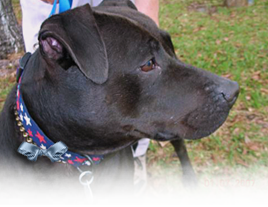
Needs A Family: Josie
- Breed: Pit Bull Terrier-Black Labrador Retriever Mix
- Gender: Female (spayed)
- Age: Adult
- Size: Medium
Contact: Animal Rescue New Orleans
504-571-1900, adoptfromarno
View More ARNO Animals:
Petfinder ■ Save-A-Pet
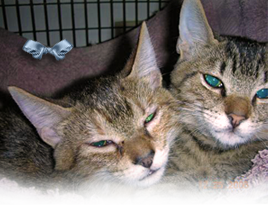
Home: Dixie & Lucas
- Breed: Domestic Short Hair Mixes
- Age: Babies
- Size: Medium
Contact: Animal Rescue New Orleans
504-571-1900, adoptfromarno
Petfinder ■ Save-A-Pet
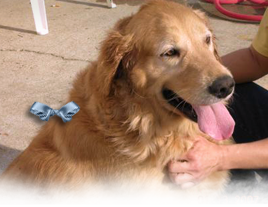
Needs A Family: Hank
- Breed: Golden Retriever
- Gender: Male (altered)
- Age: Adult
- Size: Large
Contact: Animal Rescue New Orleans
504-571-1900, adoptfromarno
Petfinder ■ Save-A-Pet
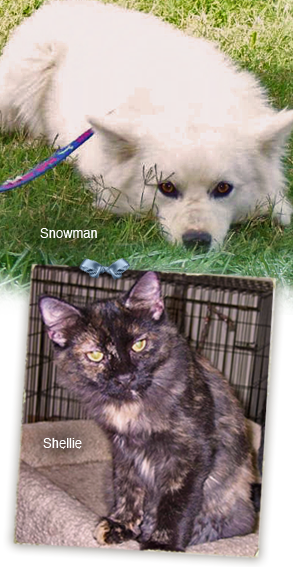
Adopt From Plaquemines
- Snowman: P.A.W.S., 504-392-1601
plaqueminescat@yahoo.com
View other dogs for adoption
- Shellie: P.A.W.S., 504-392-1601
plaqueminescat@yahoo.com
View other cats for adoption
Ramona Billot ~ P.A.W.S., the only no-kill shelter in Plaquemines Parish, is completely full. They seek out-state, no-kill shelters that can take animals. Depending upon location, P.A.W.S. can assist in transport. As long as P.A.W.S. remains full, animals go to the pound where they are killed.
Plaquemines Animal Welfare Society
504-392-1601, plaqueminescat@yahoo.com
9596 Highway 23 South
Belle Chasse, LA 70037
Donate To P.A.W.S. Relief Fund
P.O. Box 83
Belle Chasse, LA 70037
PAWS is a tax deductible 501c3.
Volunteer
Contact: Ramona Billot, 504-606-3116
102 A Omega
Belle Chase, LA 70037
Animal Friendly Hotels
Pets Welcome lists hotels that accept companion animals, with a large-dog search engine.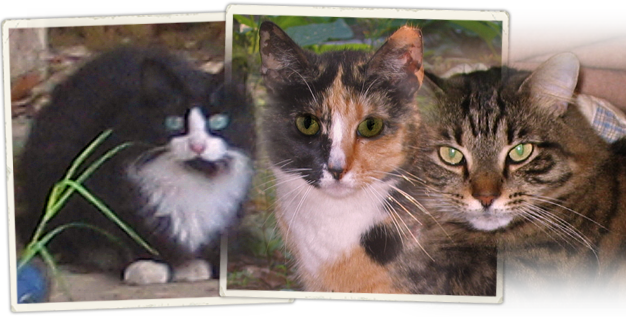
Lakeview Cats Roaming
Kathy Sweeney and Jeanette Althans created Lakeview Cats Roaming to feed, trap, and reunite animals roaming since Katrina. Remote Reunion Campaign, ARNO, Kinship Circle and others provide assistance.Foster And Forever Homes For Katrina Cats
We desperately need fosters and kitten adopters. Friendly Katrina cats left in Lakeview also deserve a chance. They have survived on the street for over two years and crave human attention.
- Fosters Needed While We Search For Guardians: Foster friendly adult cats who survived Katrina.
- Foster/Adopt Traumatized Cats: Many adult survivors were former family cats. With patience, love and a stable environment, they can be re-socialized.
- Foster/Adopt Various Age Kittens: Kittens from 2 to 8 months need gentle attention until they adjust.
- Contact: Jeanette Althans, 504-430-6477 / Kathy Sweeney, 504-343-3683
Lakeview Residents: Contact Us…
- If you can oversee a feeding station in your neighborhood or at your house. To ensure cats are fed regularly, we ask residents to assist with our food/water program.
- If you recognize your cat, a friend or neighbor's cat, or if you can foster/adopt.
- Contact: Jeanette Althans, 504-430-6477 / Kathy Sweeney, 504-343-3683
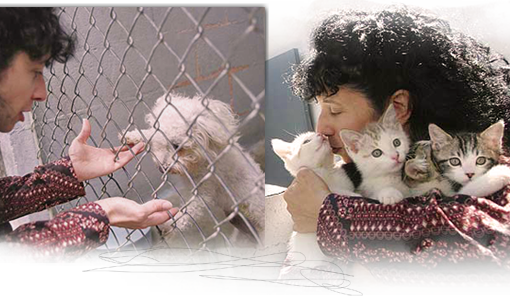
Woman Behind Landmark Spay/Neuter Bill
Animal activist Judie Mancuso spearheaded a bill to require Californians to spay/neuter cats and dogs. The woman behind the bill AB1634 is one of original-ARNO's founding coordinators, Judie Mancuso!Update: Healthy Pets Act Passes State Assembly
6/6/07, Jason Kobely, News10ABC ~ By the slimmest of margins, a controversial bill that requires California dog and cat [guardians] to spay or neuter their animals passed the state Assembly [6/6/07]. The California Healthy Pets Act, which mandates spay/neuter for pets within four months of their birth, passed by a 41-38 majority in the State Assembly. AB 1634, authored by Assemblyman Lloyd Levine, D-Van Nuys, needed 41 votes to pass. The bill now goes to the State Senate for consideration…
5/15/07 The woman behind the bill AB1634, By Lori Basheda, Orange County Register ~ So how does a pork chop-eating, nightclub-dancing Sicilian from St. Louis become a vegan animal rescuer who is now the driving force behind an impassioned campaign to curb pet overpopulation in California?
Well, movie star Pierce Brosnan's wife had no small hand in the matter. Then there was the ordeal at Rancho Lotsa Cats. In the end, though, it was the Katrina catastrophe that opened the door for Judie Mancuso to spearhead the bill which would require Californians to spay and neuter their pets if it passes this fall.
But perhaps we should take things a bit slower. Let's begin in 1988. Fresh from St. Louis, Mancuso was sharing an apartment with a roommate on Hollywood Boulevard. Like many 25-year-olds, her life revolved around her computer job and her social life. She went dancing with girlfriends, hit the band bars and ate various forms of chicken without a second thought.
But as fate would have it, her upstairs neighbor was the tomato-planting, earth-protecting Keely Shaye Smith. Smith was a personality on ABC's morning Home Show, producing a weekly segment dedicated to things like health of the planet. One day Smith (a Newport Beach native still four years away from meeting future husband Pierce Brosnan) showed Mancuso a segment she had produced on animal shelters. Viewers got to take that long walk with dogs and cats from cages to the euthanasia table.
"Kittens. Puppies. And they end up just killin' 'em, ya know?" Mancuso said the other day over a slice of tofu cheesecake at the vegan diner Native Foods in Costa Mesa. She remembers crying for hours. "And then the head just starts spinning. That whole ignorance is bliss thing; that never fit into my way of thinking. Once I have the information, I need to do something with it."
About the same time, Smith had given Mancuso "Diet for a New America," a vegan classic that details the often brutal life and death of farm animals. "I was eating meat; meatballs, the whole deal," Mancuso says. "I'm Sicilian. Hey, man. That's all I knew." Between the dead puppies and the dirty chickens, Mancuso felt compelled to change the way she was living. She quit eating animals and began volunteering at Earth Save.
In 1995 Mancuso moved to Laguna Beach. She took a seat on the board of Animal Rescue Foundation, Dana Point, and began to foster a revolving door of pets, nursing them to health and finding homes. She also sent money to Rancho Lotsa Cats. Then one day in 2003 she got a call from San Diego Animal Control; 135 filthy, wheezing cats were found at the sanctuary. The cats were set to be euthanized, unless someone found them homes.
For three months, Mancuso rallied volunteers and raised money. "We got every one of those cats out of there, and found them better lives." The ordeal led her and husband, Rolf Wicklund, to have a heart-to-heart. "What is success?" they asked. "Is it about a lot of money or doing something meaningful?"
Wicklund, 39, has a software development company. The couple had already decided they would not have children so they could devote their life to animals. Now they decided that Mancuso, who had just turned 40, would quit her job and become a full-time volunteer. This did not go over well with the family back in the Midwest. Mancuso grew up middle class. Dad was a truck driver, mom a housewife. It was bad enough when Mancuso returned home one day and rejected her mom's spedini, an Italian treat of rolled meat on a stick.
"For me not to want spedinis – holy mackerel!" Mancuso says. Her family blamed it on the bad influence of those fruit-loop Californians. But turning your back on a meatball is one thing; turning your back on financial security is another. "You should get paid for this!" her mom said. "By who?" Mancuso asked. "What? Are the dogs and kitties gonna get a jar together?"
Shortly after quitting work, Katrina hit. Fellow rescuer Jane Garrison, from Redondo Beach, called Mancuso in tears. She was in New Orleans; dogs were tethered to fences, floating in cages. Mancuso was on the next plane. Back in Laguna, she wrote a computer program for Animal Rescue New Orleans, working 12-hour days for the next six months to reunite pets with guardians.
As the rescue effort wound down, Los Angeles Animal Services General Manager Ed Boks held a press conference, encouraging the public to adopt shelter animals to make room for Katrina pets.
Mancuso knew Boks had a "no-kill" philosophy. The only way to reduce euthanasia is to reduce pet population. Here was her chance. She showed up at the press conference asked Boks if he would do a spay-and-neuter bill with her. Over the next year, the two birthed the California Healthy Pets Act. The bill is making its way through the Legislature. It requires residents to spay/neuter their cats and dogs by the time the animals are four months old. The list of supporters is 320 long and includes rescue groups, the California Veterinary Medical Association and the California Animal Control Directors Association.
But breeder associations are fighting hard. The bill would require people who want to breed dogs to get a permit — every year. Breeders consider it a tax and are pouring millions of dollars into the fight. The American Kennel Club Web site rallies opponents. To raise money for the battle, Mancuso last summer started the nonprofit Social Compassion, which is based in Laguna.
Bill supporters say they're not out to hurt breeders, just curb euthanasia and fiscal waste. In 2005, city and county shelters took in more than 840,000 cats and dogs. Some 430,000 were killed. The cost to taxpayers: $250 million. "Judie is the campaign chairman for an initiative that could change animal welfare … in California," Boks says. "She's a force of nature. She's a consensus builder. She brings people to the table."
Just don't expect her to serve you a pork chop.
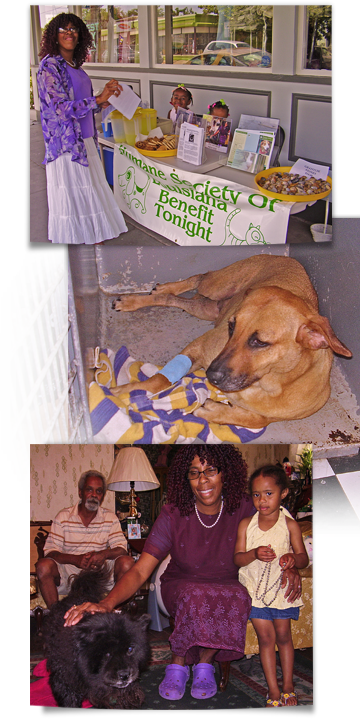
Selling Lemonade To Aid Dogs
Times Picayune ~ In an unusual fundraising venture, the Humane Society of Louisiana raised $1,000 Saturday to cover medical expenses of a pair of dogs ailing since Hurricane Katrina. Volunteers sold lemonade for $1 a cup and "gratitude stones" for $10 each outside the Belladonna Day Spa on Magazine Street, raising about $650 between noon and 3 p.m., according to group spokesman Jeff Dorson. He said people interested in the drive had committed to providing donations needed to reach the goal of $1,000 to ensure medical help for the dogs.One of the dogs, Princess, an 11-year-old chow, was abandoned at her home after law enforcement officers prevented her family from retrieving her after Katrina hit. Volunteers from the Humane Society of Louisiana later rescued the dog and, after that she was temporarily cared for in Kentucky, before returned to her guardian. Princess has suffered from severe eye infections that left the dog blind. One eye has already been removed and a second eye needs to be removed, but the family doesn't have money needed for the second operation, estimated at $600, according to the animal advocacy group.
Another survivor of the storm, a mix-breed named Missy, was abandoned by her guardians after the storm destroyed their junk yard, and the Humane Society of Louisiana is defraying expenses for an elderly neighbor caring for the dog. Missy, about six years old, has been diagnosed with advanced heartworm disease and ongoing treatment is expected to cost $400.
Dorson said his organization has spent $500,000 on veterinarian care for animals since the storm and, because of the enthusiastic response Saturday, expects to repeat use of the lemonade-stand idea. "It seems to work when people identify exactly where their money goes," he said. "The feedback we get is people want to invest in the welfare of these two dogs."
Adopters Return Katrina Dogs
5/22/07 Associated Press ~ A custody dispute over two dogs lost in Hurricane Katrina ended when the Florida women who adopted them after the storm agreed to return them. "This is what we wanted, our dogs back home," Doreen Couture said at an emotional news conference. She, her husband Steve, and their two children lived in St. Bernard Parish, LA, when they lost almost everything in the 2005 storm. They had dropped their dogs off at a temporary shelter before fleeing.In the chaos that followed, the animals — a St. Bernard and a shepherd mix — ended up at a shelter in Pinellas County, FL. They were adopted into two different homes. The Coutures eventually learned where the dogs were and sued last year to have them returned. The new guardians claimed they adopted the dogs in good faith and vowed to fight. A trial date had been set for this July.
Going Home — Pam Bondi, a local prosecutor who adopted the St. Bernard, said she decided to give him back after getting to know and visiting the Coutures in Louisiana. Bondi said Rhonda Rineker, the Dunedin woman who adopted the shepherd mix, also agreed to return her dog to the Coutures. Rineker has not commented.
A tearful Bondi said she'd visit the dog she called Noah and the Coutures call Master Tank. "Thanks to these good people, I will be a big part of his life. I promised to love, protect and keep him safe his entire life, and that's what I plan to do," Bondi said. She had said she spent thousands of dollars for the dog's health problems that predated the storm, while the Coutures denied that his health had been neglected. Steve Couture said the family, now living in St. Tammany Parish, planned to pick up the dogs later Tuesday and then head back to Louisiana.



